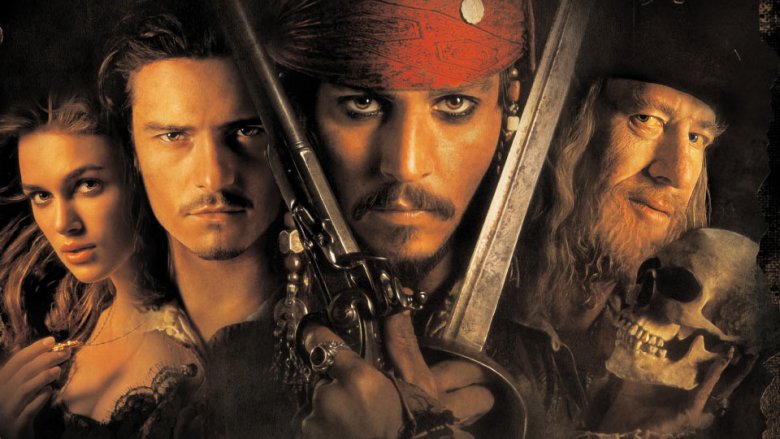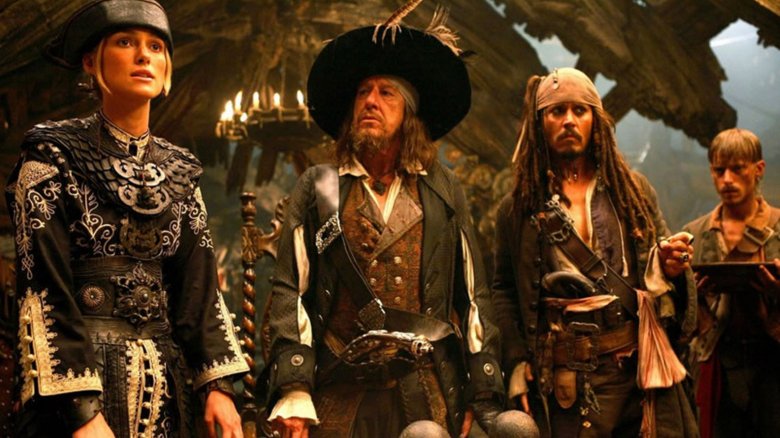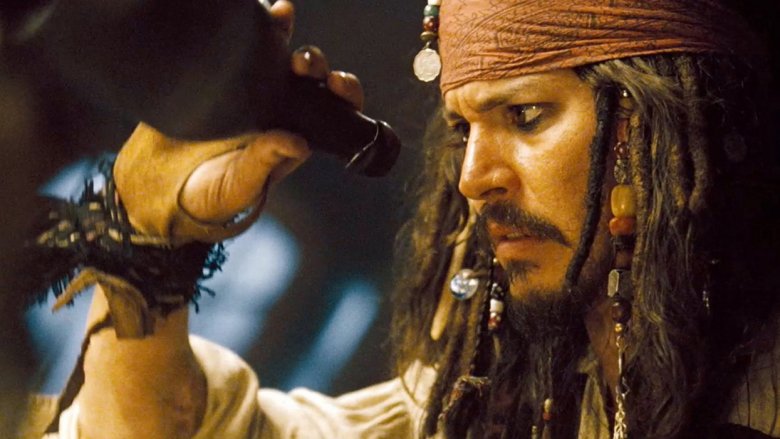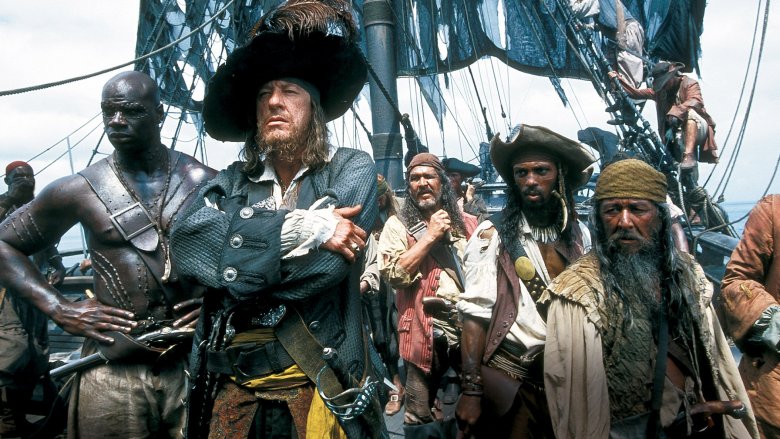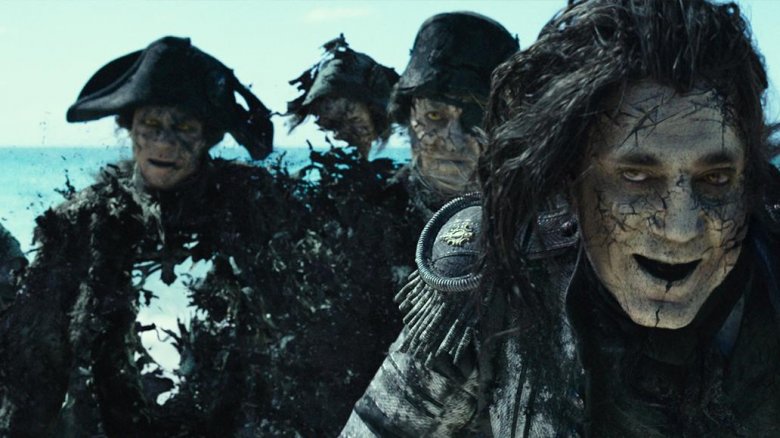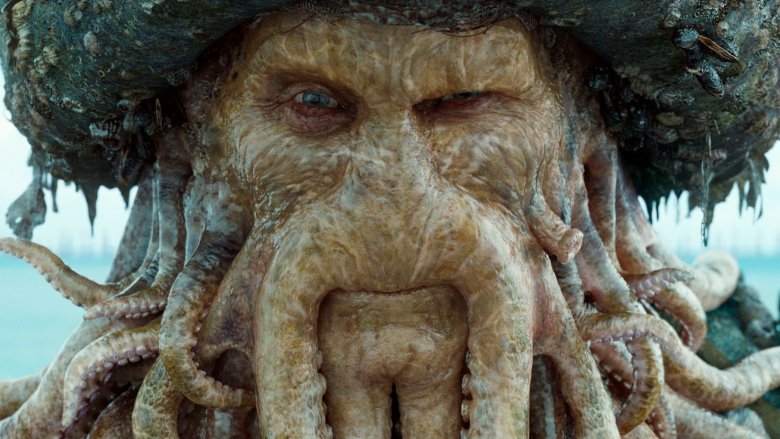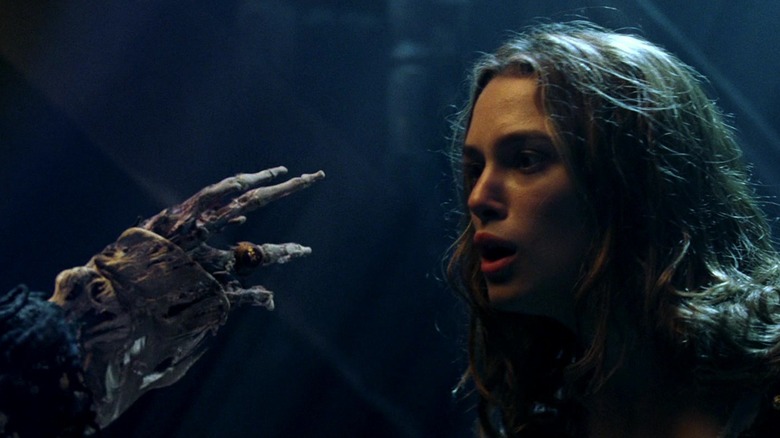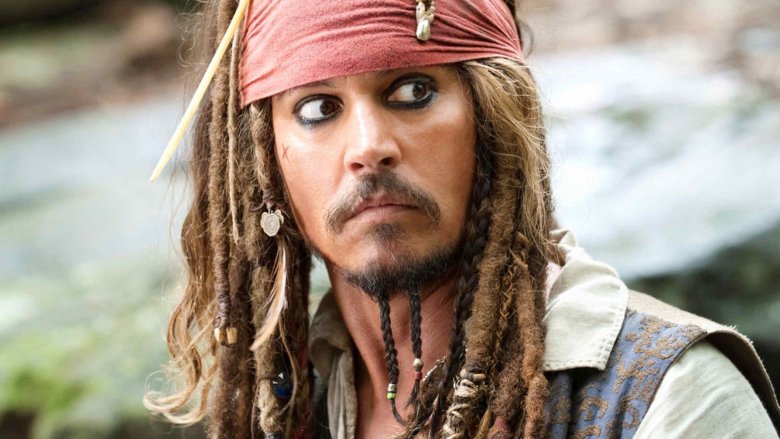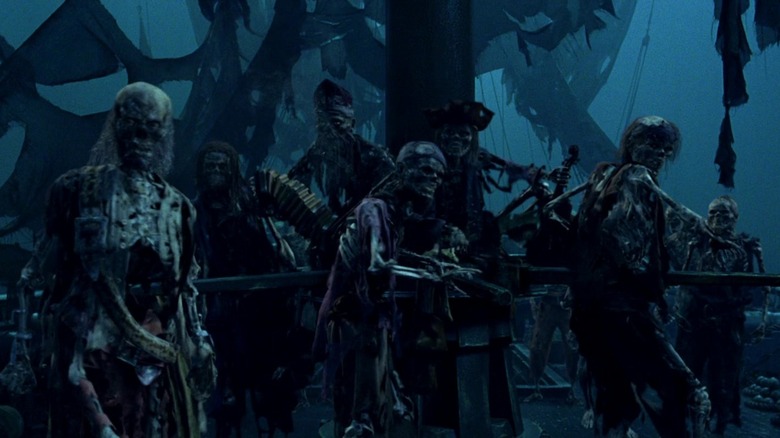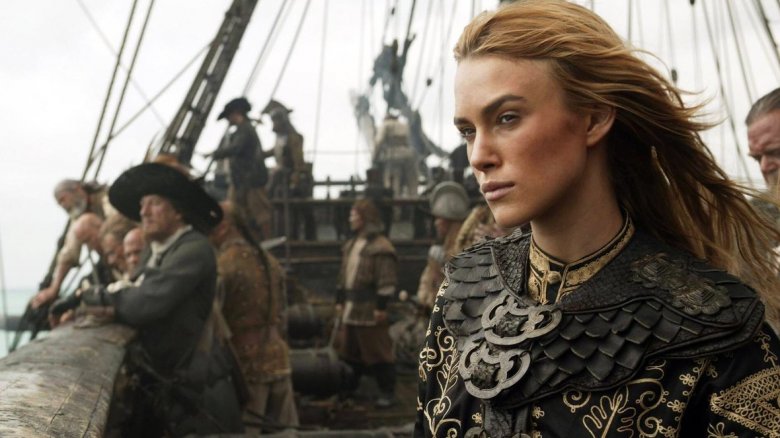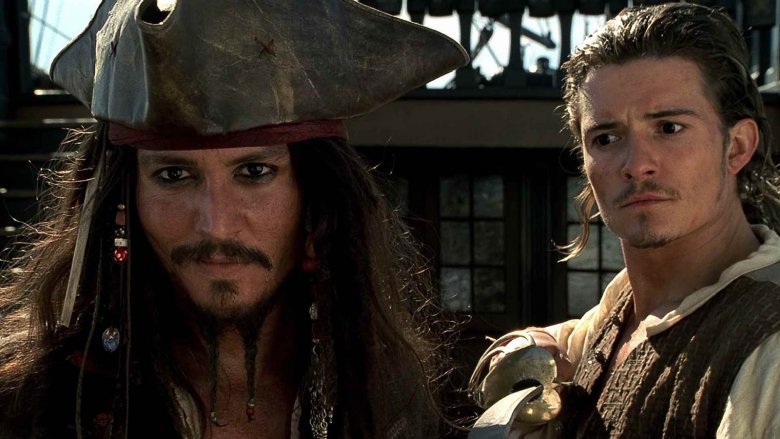How Pirates Of The Caribbean Changed Action Movies And No One Noticed
Pirates of the Caribbean: Dead Men Tell No Tales became the fifth installment in Disney's rollicking action-adventure franchise in 2017, and all these years later, there's still talk of a potential sixth film. The world continues to love Jack Sparrow and his grizzled compatriots, their questionably legal adventures, and above all, the fabulous depths of fantasy to which their journeys take them. These heroes have faced down everything: zombies, ancient curses, indentured servitude, thwarted love, and even a couple of murderous mermaids. In the age of the mega-franchise, Pirates is mighty indeed.
But it wasn't always bottles of rum and a hearty yo-ho-ho for Sparrow and crew. Making the first film was, in fact, an exercise in risk-taking that ended up paying dividends beyond what anyone could have imagined. Today, the legacy of its daring choices guides the action genre in a myriad of ways, large and small. We're here to examine the world Pirates made, from the zombies to the heroines and all the inebriated quips in between.
No genre is beyond saving
Pirates were, until Johnny Depp swaggered his way on camera to vast and passionate acclaim, box office poison in the modern era of film. Gone were the days of rope-swinging and damsel-snatching that gave rise to the movie's namesake Disneyland attraction, first opened in 1967. The last major effort at portraying high seas adventure had been 1995's Cutthroat Island, a total flop. The people, Hollywood agreed, had spoken: pirates were out, unless there were Muppets involved.
It's hard to remember this today, of course, now that Pirates of the Caribbean has been one of the most massively successful franchises around for over a decade. But it was a risk that Disney's then-CEO Michael Eisner was openly nervous about making. Sure, Disney had tossed around the idea of a ride-based movie for years. Yeah, the idea of undead sailors was fun. But pirates? In 2003? Good thing audiences answered with resounding cheers, thus proving that no genre is beyond saving. Years later, studios have reaped the rewards of betting on subject matter as niche as Marvel's lesser heroes, a Mad Max reboot with feminist subtext, and bringing back Godzilla and all his monstrous friends. If people will show up for pirates, what won't they show up for, given the right cast and crew?
Jack Sparrow is a drunk buffoon — and people love him
Eisner wasn't too keen on the idea of a pirate-themed movie in general, but he was, if anything, even less sold on Johnny Depp's unusual performance. "It trickled back to me that Michael Eisner went on some sort of bent...'" Depp recalled in 2015. "'What is that thing? It is drunk, is it gay?' I really expected to be fired but I wasn't for some reason. They were actually gonna put subtitles under my character, they couldn't understand Captain Jack."
This is, of course, exactly what made Jack Sparrow such an electric leading man. He's a suave, handsome, capable rogue, sure. But he's also an eyeliner-wearing drunk more reminiscent of 1970s excess than pirate standard-bearer Errol Flynn. Cutthroat Island's failure proved that audiences weren't looking for earnest rehashes of the past, but for something new, something weird, and above all, something audacious. Sparrow's flamboyance, comfort with failure, and general oddness paved the way for everything from Tony Stark's anxious smugness to Ezra Miller's jittery, oddball take on the Flash. The hero doesn't need to be a pillar of untarnished masculinity — he can be, in fact, a weirdo, and the people will still cheer him on.
Going back to a sure thing isn't always necessary
Disney might seem like an unconquerable behemoth nowadays, with its acquisitions of media titans like Marvel and films like Frozen gobbling up the zeitgeist for years at a time. But in the early 2000s, things were a bit more dire. Sure, the Disney Renaissance, as it is now known, had brought the company to new heights with classics like The Lion King and The Little Mermaid. Yes, everyone in the world knew what Mickey Mouse looked like and Beauty and the Beast had netted a Best Picture nomination. But passion projects like Treasure Planet and seemingly sure things like Pearl Harbor had turned out to be total failures. Risk-taking was not being rewarded by audiences. The ship wasn't sinking, but a hole or two had sprung.
All of that makes it kind of miracle that Curse of the Black Pearl was greenlit at all. But Pirates of the Caribbean's triumph proved that missteps like Treasure Planet and Pearl Harbor shouldn't discourage a studio from experimenting. Its surprise success paved the way for oddities that have enlivened action cinema, from Iron Man to Baby Driver. Weirdness pays off in the right hands, even if it comes after a string of failures.
Genre mash-ups can enliven old stories
Pirate stories are pretty much always adventures at heart. Pirates of the Caribbean has that in spades, what with the multiple naval battles, daring rescues, and nimble swordsmanship. But it's also a horror story. And a comedy. And, more and more as the series has worn on, a fantasy epic with its own rules and conventions. These genres were considerably less common in sea-set sagas, let alone smashed together as they are in this franchise. There are zombies! The hero speaks largely in drunken non-sequiturs! The ocean is ruled by an undead octopus man who is in love with the goddess of the sea! The rules did not apply to Pirates of the Caribbean from the beginning, and it ended up being a huge hit because of that willingness to smash genres together.
The clearest example of this legacy is in the Marvel Cinematic Universe, the long-time apex predator of the action movie world, which are notable for being enormously successful and very difficult to pin down to discrete genre categories. Some of its entries are laid-back comedies, as in the Guardians of the Galaxy films. Some, like Spider-Man: Homecoming, are sweet-natured high school rom-coms which borrow as much from John Hughes as they do Jack Kirby. And yet, somehow, it coheres. The lines between genre don't exist in the MCU, just as they don't in Pirates of the Caribbean, and historically speaking, the public has turned out for it in droves.
Modern audiences love dense mythologies
Remember when geeky things were uncool? If you're young enough, you might not. That's how long things like superheroes, elves, video games and teenage wizards have ruled popular culture. It wasn't always this way, however, and in fact it took success to the tune of billions of dollars to turn the tide. The concept of densely mythologized universes like that of The Lord of the Rings, Harry Potter, or Marvel being palatable to the masses was absurd. It was too much to remember! Until it wasn't, and suddenly the average man on the street knew phrases like "the Eye of Agamotto" and "the Ministry of Magic's Department of Mysteries."
But all of those massive movie franchises had legacy, built-in fandoms, and proven importance. Pirates of the Caribbean, by contrast, was entirely new. Sure, it was inspired by a classic ride, but the ride's atmospheric scenes never added up to a fleshed-out world or even a plot. That all had to come from the filmmakers, and it grew to become a fantasy saga all its own. It turned out that the public really could embrace complexity without prior knowledge. Now we live in a world in which Frozen 2 explores how and why Elsa's magic is the way it is, while the Star Wars series (Pirates' progenitor in this aspect) has given its original trilogy both a past and a future with its own dizzying lore. We're all geeks now, and we're not stopping anytime soon.
People like to be scared, even when it's unexpected
The idea of Disney is strong among the masses, if not always accurate. Princesses, magic, romance, and happily-ever-after sums it up neatly — especially that last part. A Disney movie, goes the thinking, might subject you to sadness, but the ending will be much more sweet than bitter. Lilo and Stitch find each other. Cinderella marries the prince. Elsa's love saves Anna, and Arendelle is open to all. Smiles and hugs ensue, a pop anthem plays over the credits.
This is part of Disney, sure. A huge part, even. But for every "Steamboat Willie" there is "Night on Bald Mountain." For every "I Just Can't Wait to be King" there is "Hellfire." There can be no good without evil, and Disney succeeds at both spectacularly. Pirates understood this intimately, and even gambled on the public's love for Disney's brand of horror. The zombie pirates are prone to jokes, sure, but they are genuinely scary in their hollow-boned sneering. Tia Dalma, the goddess Calypso's human form, is a beautiful woman in rags, with black grime rubbed into her teeth. It's deliciously dark, cunningly creepy, and its legacy lives on in Maleficent, the Descendents series, and even non-Disney action-horror ventures like the smash hit It. People want victory, comfort, and ridings-off into the sunset... but they want to be terrified, too.
Franchises need to be guided by character
Franchise sprawl is the law of the land. There are nearly 40 MCU movies, seven live-action Transformers movies, and (depending on how you count 'em) about a dozen Star Wars movies. And there are no signs of stopping. Studios propose their own universes with increasing frequency. But not everyone can succeed — witness the death of the Dark Universe or the DC Extended Universe — and what makes a franchise a solid bet can seem opaque.
One thing that emerges from the murk is the importance of strong central characters. No personality truly emerged in The Mummy, and so the Dark Universe has been shuttered. Kylo Ren distinguished himself early on in Star Wars: The Force Awakens, and so he's one of the most discussed aspects of the recent trilogy. Jack Sparrow was an early indicator of this approach's efficacy — indeed, in many ways its most recent ancestor. People loved Johnny Depp's portrayal, and so they follow the series through new characters, locations, and plots. People went on to love Tony Stark, could forgive the lackluster Iron Man 2, and ended up making him the linchpin of a decade-spanning saga. It comes down to character, and Jack Sparrow made that a beacon to a burgeoning new era of film.
Zombies belong in everything
Zombies ruled the beginning of the 21st century. We laughed at them in Zombieland, ran from them in fitness app Zombies, Run! and, of course, chronicled their devastation in The Walking Dead. Though the craze's most dominant days might be in the past, we're still gobbling up shows like Santa Clarita Diet like the brain-munching undead are going out of style. They're genre-flexible, a metaphor for all manner of social ills, and incredibly cool to see through the lens of multiple animators, prop designers, and makeup artists.
Back in 2004, however, zombies were pretty dormant. Then Curse of the Black Pearl premiered, and, well, people still quote "You best start believing in ghost stories... you're in one!" A relatively late addition to the story courtesy of Shrek writers Ted Elliot and Terry Rossio, the concept of the zombie crew is what made Jerry Bruckheimer commit to producing Curse of the Black Pearl. It wasn't just a pirate story anymore, but a unique take on an old genre, with the intriguing twist of the zombies' true nature only being revealed in moonlight. The effects looked fantastic, the reveal was well-received, and the reinvigoration of the zombie genre had begun... hunger for "braaaaaains" not included.
The love interest can surpass the heroes
Elizabeth Swann has grit from the very beginning. She's undaunted by her corset, her cautious father, her refined upbringing, and the looming proposal of the enormously proper Norrington. She wants to be a pirate, and by God, she becomes one. The first Pirates movie sees her drunk and dancing, standing up to undead criminals, and ultimately, becoming a hero in her own right. The following two take her all the way to becoming the Pirate King.
Heroines weren't exactly thin on the ground before Curse of the Black Pearl. Mulan had saved China, Hermione Granger was dazzling the wizarding world, and Arwen saved Frodo as often as anyone was saving her. But over the course of the first three Pirates movies, Elizabeth Swann surpassed the role entirely, going from "spunky girlfriend" to "central hero," to the point that her ratio of action-to-dialogue ended up outclassing her beau's. She saves the imperiled and finishes critical fights. Of the three central protagonists, she is the conventional action hero to Jack's quirky rake and Will's soulful stud, and she is allowed a degree of moral imperfection few heroines ever are. You can draw a direct line from Elizabeth Swann flirting with Jack Sparrow and, as a result, cheating on dear, dopey Will to Katniss Everdeen's prickly pragmatism. She wasn't just daring — she was flawed.
Risky casting can pay off massively
DisneyWar, James B. Stewart's expose of the Mouse House under Michael Eisner, speaks modestly when it describes Johnny Depp as "hardly an obvious choice for a Disney action-adventure." Depp was the moody star of What's Eating Gilbert Grape? and Edward Scissorhands — could he really be a pirate captain in a movie for the masses? Director Gore Verbinski encouraged Depp to play up Sparrow's eccentricities as Will Turner would fulfill the more conventionally masculine role, and Depp hit the ground running. He was smug! He was drunk! Depp thought, for a while, that he shouldn't have a nose! "This could be the end of our careers," Verbinski reportedly said, "but let's have fun."
They did have fun — and they made bank. Depp's Sparrow proved that the riskiest casting could also be the most lucrative, and we're living in the world that pivotal choice built. Robert Downey Jr., also a man with a complicated past and an eccentric style, became Tony Stark. Daniel Craig was seen by many as too rough-looking and too brutal in manner to play Bond, but Skyfall and Casino Royale have become modern classics. Curse of the Black Pearl was chock-full of the action people expected, but it came with a personality no one anticipated. Now wannabe Verbinskis chase that dream, knowing it can pay off creatively and commercially.
